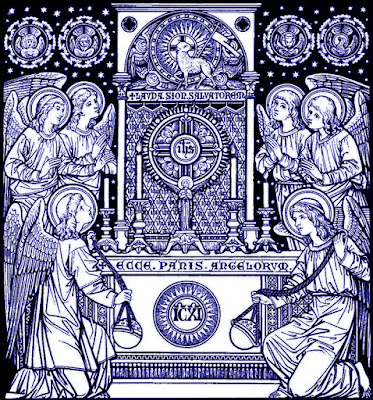Adoration
Adoration (Latin) is respect,
reverence, strong admiration or devotion. The term comes from the Latin
adōrātiō, meaning "to give homage or worship to someone or
something".
In Eastern countries, adoration has
been performed in an attitude still more lowly. The Persian method, introduced
by Cyrus the Great, was to kiss the knee and fall on the face at the prince's
feet, striking the earth with the forehead and kissing the ground.
This striking of the earth with the
forehead, usually a fixed number of times, was a form of adoration sometimes
paid to Eastern potentates.
The Jews kissed in homage, as did
other groups mentioned in the Old Testament. Thus in 1 Kings 19:18, God is made
to say, "Yet I have left me seven thousand in Israel, all the knees which
have not bowed unto Baal, and every mouth which hath not kissed him.
" And in Psalms 2:12, "Kiss
the Son, lest he be angry, and ye perish from the way."
In Western Europe, the ceremony of
kissing the sovereign's hand, and some other acts which are performed while
kneeling, may be described as forms of adoration.
Adoration in the Catholic Church takes
several forms. One is the simple adoration of God Himself. Adoration also takes
the form of Eucharistic adoration.
The Catholic belief in
transubstantiation is that the bread and wine literally become the body and
blood of Jesus Christ, through which Catholics adore Jesus Christ in
remembrance of what He gave. The host is usually placed in a monstrance, and
reverently viewed at Benedictions and during adoration.
Some churches contain "Adoration
Chapels" in which the Eucharist is continuously on display that the
faithful may observe their faith through it.
The Catechism of the Catholic Church
states that "Adoration is the acknowledgement of God as God, creator and
savior, the Lord and master of everything that exists, as infinite and merciful
love." "Adoration is homage of the spirit to the King of glory,
respectful silence in the presence of the ever greater God." Adoration is
prompted by the Holy Spirit.
In the strict sense, adoration is an
act of religion offered to God in acknowledgment of His supreme perfection and
dominion, and of the creature's dependence upon Him. "The rational
creature, looking up to God, whom reason and revelation show to be infinitely
perfect, cannot in right and justice maintain an attitude of indifference. That
perfection which is infinite in itself and the source and fulfilment of all the
good that we possess or shall possess, we must worship, acknowledging its
immensity, and submitting to its supremacy."
In Luke 4:7-8, Jesus tells the
tempter, "Scripture has it, 'You shall do homage to the Lord your God, Him
alone shall you adore.'" The worship called forth by God, and given
exclusively to Him as God, is designated by the Greek name latreia (Latinized,
latria), which is usually translated "Adoration". Adoration differs
from other acts of worship, such as supplication, confession of sin, etc.,
inasmuch as it formally consists in self-abasement before the Infinite, and in
devout recognition of His transcendent excellence. The primary and fundamental
element in adoration is an interior act of mind and will; the mind perceiving
that God's perfection is infinite, the will bidding one to extol and worship
this perfection.
Adoration is a willing submission of
self to God expressed interiorly as well as exteriorly by one's actions. It is
an interior act of mind and will where the mind humbly admits that God's
perfection is infinite, and the will moves one us to worship this perfection.
An acknowledge of God's right as God to be Lord of one's life and in control of
it involves a voluntarily offer of submission.
Thomas Aquinas says: "Adoration
is primarily an interior reverence for God expressing itself secondarily in bodily
signs of humility: bending our knee (to express our weakness compared to God)
and prostrating ourselves (to show that of ourselves we are nothing)."
Genuflecting is an outward gesture of an inward attitude of adoration towards
God, as is the praying of the Pater Noster. "The first phrase of the Our
Father is a blessing of adoration before it is a supplication. For it is the
glory of God that we should recognize Him as "Father", the true
God".
Adoration also takes the form of
Eucharistic adoration. The Catholic belief in transubstantiation is that the
bread and wine literally become the body and blood of Jesus Christ, through
which Catholics adore Jesus Christ. The host is usually placed in a monstrance,
and reverently viewed at Benedictions and during adoration. Some churches
contain "adoration chapels" in which the Eucharist is continuously on
display that the faithful may observe their faith through it. "The Cure of
Ars would spend hours in front of the Blessed Sacrament. When people would ask
him what he would do or say during those hours, he would say: 'He looks at me,
and I look at him.'"
Adoration is reflected in the prayer
of praise which acknowledges God for who he is in comparison to the prayer of
thanksgiving which acknowledges God for what he has done. Rev. Raniero
Cantalamesa observed that "the greatest danger with God is for us to
become accustomed to him, to fall from awe into routine."





Comments
Post a Comment